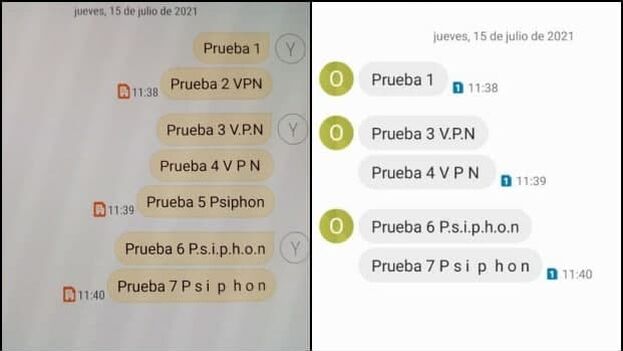
![]() 14ymedio, Havana, July 15, 2021 – After the popular protests last Sunday, the Cuban Telecommunications Company S.A. (Etecsa) has not only censored instant messaging services such as Telegram and WhatsApp, but has also implemented a filter that prevents mobile phones from sending text-only messages that contain the letters VPN (Virtual Private Network) and the name of the Psiphon tool.
14ymedio, Havana, July 15, 2021 – After the popular protests last Sunday, the Cuban Telecommunications Company S.A. (Etecsa) has not only censored instant messaging services such as Telegram and WhatsApp, but has also implemented a filter that prevents mobile phones from sending text-only messages that contain the letters VPN (Virtual Private Network) and the name of the Psiphon tool.
With this censorship, Etecsa could be trying to prevent the users of the state monopoly from passing on details about the use of VPNs (virtual private networks), essential to circumvent the blockade against the independent press media, the only ones reporting on the July 11 demonstrations, and also block the uploading of videos of these protests to social networks.
“I wanted to tell my cousin in Cárdenas that if he couldn’t open Facebook Messenger, he could use the Psiphon VPN, but he never responded to the text messages I wrote him,” Darío, a 22-year-old young man who used the anti-censorship tool only a few days ago, tells 14ymedio.
“When I called my cousin to check, he told me that he hadn’t received anything by SMS. That’s when I sent him another message, in which I separated the letters “V P N”, and then he received it,” he said. “The worst thing is that Etecsa charged me for all the previous messages as if they had sent them and they had reached their destination. It’s a scam!”

Another customer of the company reported that the word “Psiphon” is also blocked in SMS, and messages sent from Cuban nationals that include the name of this tool never reach the recipient’s inbox. “They don’t want people to find out how they can access certain services that have been blocked since Sunday.”
This newspaper conducted the same test with several combinations of messages in which the initials VPN were included together, separated by spaces, and by periods. The same procedure was repeated with the word “Psiphon” and all of these checks, carried out from a dozen mobile numbers in five provinces of the country, produced the same results: the SMS only arrived if a space or a period was inserted between each letter.
Psiphon is a widely used tool in Cuba, but for three days its use exploded due to the cutting of many internet services. The application includes different mechanisms to avoid censorship that are used by a variety of servers, proxy servers, and VPN technologies. Several press outlets recommend using it to read their content from countries with censorship.
For years, users of the only cell phone company in the country have suffered from online congestion and limited areas of coverage, but also from the strict blocking of key terms and phrases on mobile messaging, also known as SMS, its acronym in English.
Five years ago, this newspaper published a list of words that were censored at that time. Several users, annoyed that their messages were collected but not delivered, then verified that SMS containing references to “human rights,” “hunger strike,” and the names of various dissidents and independent journalists, never reached their destination.
The contract that each user signs with Cubacel (Etecsa’s cellular network) when activating a mobile phone line specifies that among the causes for terminating service is any use “that violates morality, public order, the Security of the State, or serves to support the carrying out of criminal activities.”
Customers are never warned that their messages will be subjected to a content filter or that part of their correspondence will be blocked if it refers to dissidents, concepts uncomfortable for the ruling party such as “human rights,” or blogs critical of the Government.
With more than six million cell phone users, telecommunications censorship in Cuba is not a new tool for the Plaza de la Revolución. This Monday and Tuesday most of the cell phones on the island were without a web browsing service. Activists frequently denounce the blocking of their mobile phones on December 10 (Human Rights Day) or when they try to meet.
Blocking uncomfortable digital sites has also been a frequent practice for the ruling party. On the list of the inaccessible you’ll find everything from foreign sources such as Cubaencuentro to local newspapers such as 14ymedio. Many users manage to circumvent censorship by sending news by email and making offline copies of the pages, which are passed from hand to hand thanks to technological devices such as USB memory sticks or external hard drives.
With the arrival of internet connection service to mobile phones in December 2018, instant messaging services such as Telegram, WhatsApp and Facebook’s Messenger have become very popular among citizens, activists, and informal merchants. More difficult to control than SMS, these platforms played an important role in last Sunday’s assemblies.
Translated by Tomás A.
____________
COLLABORATE WITH OUR WORK: The 14ymedio team is committed to practicing serious journalism that reflects Cuba’s reality in all its depth. Thank you for joining us on this long journey. We invite you to continue supporting us by becoming a member of 14ymedio now. Together we can continue transforming journalism in Cuba.
